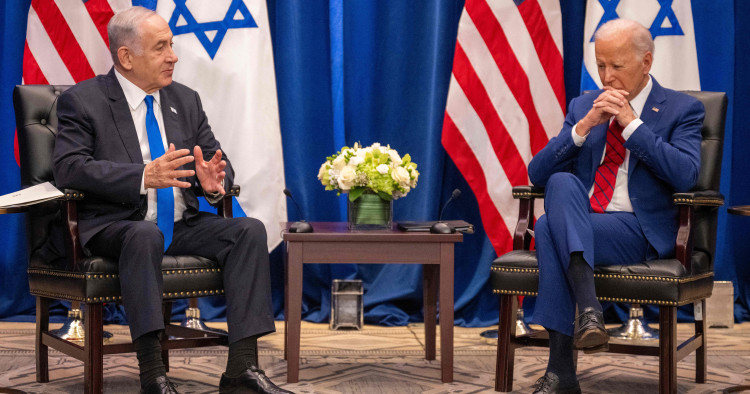A year ago, in the wake of Hamas’s Oct. 7 attack, U.S. President Joe Biden traveled to Tel Aviv and met with Israeli Prime Minister Benjamin Netanyahu to reiterate his administration’s unwavering support for Israel. Biden’s embrace of Netanyahu was rooted in the belief that only positive inducements and constant reassurances—both militarily and diplomatically—could restrain Israel’s actions in Gaza. In reality, though, this “bear hug” diplomacy has resulted in an unmitigated failure.
Since the onset of Israel’s offensive campaign in Gaza, the Biden administration has pursued four policy objectives: supporting Israel’s military campaign to eliminate the security threat posed by Hamas; helping to secure the release of hostages held in Gaza; mitigating harm to Palestinian civilians; and preventing an all-out war in the region.
A year later, however, more than 42,000 Palestinians are dead, and most of Gaza is in ruins, with its 2 million inhabitants facing one of the worst humanitarian disasters of this century. Israel has failed to achieve its stated goal of completely eliminating Hamas, and some 100 hostages remain captive in Gaza. Meanwhile, U.S.-sponsored cease-fire talks between Israel and Hamas have all but collapsed, even as the war has now spread to Lebanon, and the threat of a wider war with Iran looms on the horizon.
Continue reading in Foreign Policy
The Middle East Institute (MEI) is an independent, non-partisan, non-for-profit, educational organization. It does not engage in advocacy and its scholars’ opinions are their own. MEI welcomes financial donations, but retains sole editorial control over its work and its publications reflect only the authors’ views. For a listing of MEI donors, please click here.













